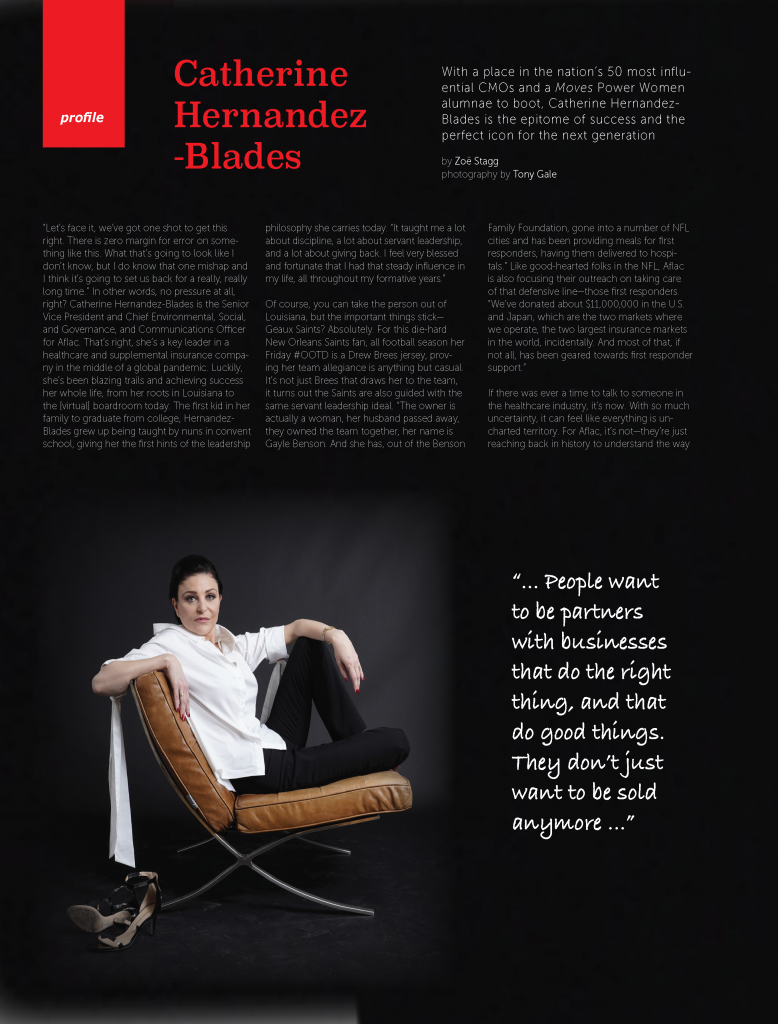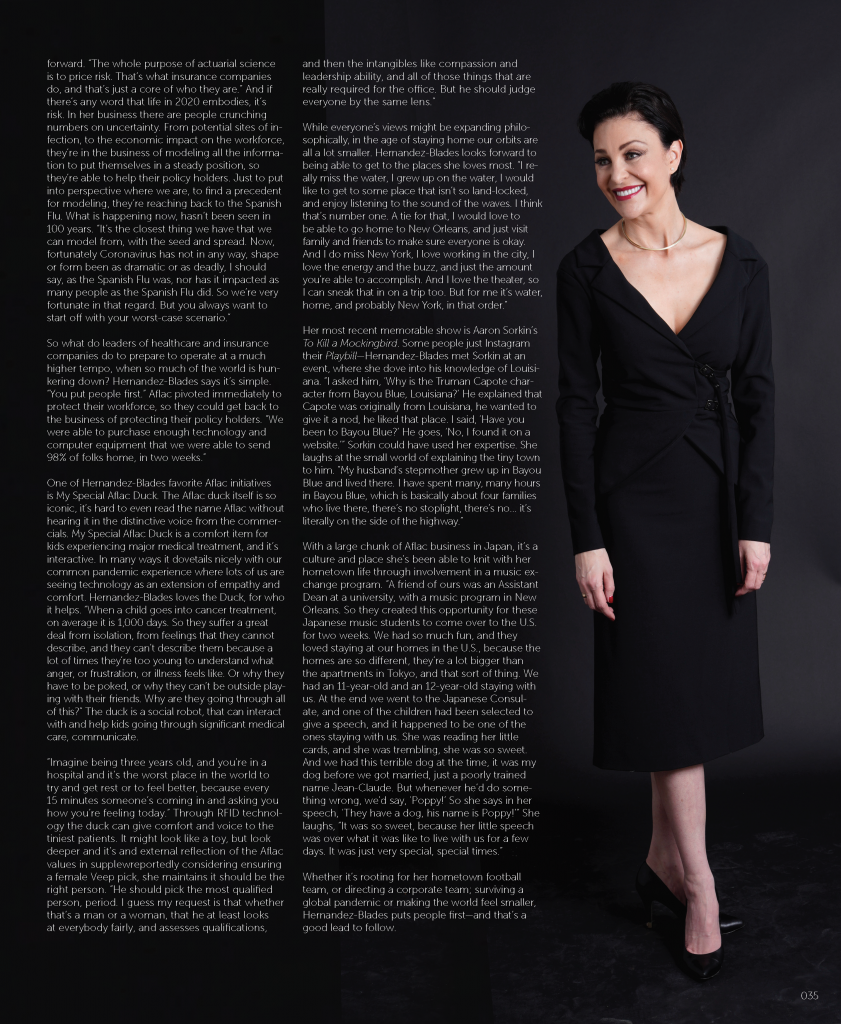With a place in the nation’s 50 most influential CMOs and a Moves Power Women alumnae to boot, Catherine Hernandez-Blades is the epitome of success and the perfect icon for the next generation.
by Zoë Stagg
photography by Tony Gale
“Let’s face it, we’ve got one shot to get this right. There is zero margin for error on something like this. What that’s going to look like I don’t know, but I do know that one mishap and I think it’s going to set us back for a really, really long time.” In other words, no pressure at all, right? Catherine Hernandez-Blades is the Senior Vice President and Chief Environmental, Social, and Governance, and Communications Officer for Aflac. That’s right, she’s a key leader in a healthcare and supplemental insurance company in the middle of a global pandemic. Luckily, she’s been blazing trails and achieving success her whole life, from her roots in Louisiana to the [virtual] boardroom today. The first kid in her family to graduate from college, Hernandez-Blades grew up being taught by nuns in convent school, giving her the first hints of the leadership philosophy she carries today. “It taught me a lot about discipline, a lot about servant leadership, and a lot about giving back. I feel very blessed and fortunate that I had that steady influence in my life, all throughout my formative years.”
Of course, you can take the person out of Louisiana, but the important things stick— Geaux Saints? Absolutely. For this die-hard New Orleans Saints fan, all football season her Friday #OOTD is a Drew Brees jersey, proving her team allegiance is anything but casual.
It’s not just Brees that draws her to the team, it turns out the Saints are also guided with the same servant leadership ideal. “The owner is actually a woman, her husband passed away, they owned the team together, her name is Gayle Benson. And she has, out of the Benson Family Foundation, gone into a number of NFL cities and has been providing meals for first responders, having them delivered to hospitals.”
Like good-hearted folks in the NFL, Aflac is also focusing their outreach on taking care of that defensive line—those first responders. “We’ve donated about $11,000,000 in the U.S. and Japan, which are the two markets where we operate, the two largest insurance markets in the world, incidentally. And most of that, if not all, has been geared towards first responder support.”
If there was ever a time to talk to someone in the healthcare industry, it’s now. With so much uncertainty, it can feel like everything is uncharted territory. For Aflac, it’s not—they’re just reaching back in history to understand the way forward. “The whole purpose of actuarial science is to price risk. That’s what insurance companies do, and that’s just a core of who they are.” And if there’s any word that life in 2020 embodies, it’s risk. In her business there are people crunching numbers on uncertainty. From potential sites of infection, to the economic impact on the workforce, they’re in the business of modeling all the information to put themselves in a steady position, so they’re able to help their policy holders. Just to put into perspective where we are, to find a precedent for modeling, they’re reaching back to the Spanish Flu. What is happening now, hasn’t been seen in 100 years. “It’s the closest thing we have that we can model from, with the seed and spread. Now, fortunately Coronavirus has not in any way, shape or form been as dramatic or as deadly, I should say, as the Spanish Flu was, nor has it impacted as many people as the Spanish Flu did. So we’re very fortunate in that regard. But you always want to start off with your worst-case scenario.”
So what do leaders of healthcare and insurance companies do to prepare to operate at a much higher tempo, when so much of the world is hunkering down? Hernandez-Blades says it’s simple. “You put people first.” Aflac pivoted immediately to protect their workforce, so they could get back to the business of protecting their policyholders. “We were able to purchase enough technology and computer equipment that we were able to send 98% of folks home, in two weeks.”
One of Hernandez-Blades favorite Aflac initiatives is My Special Aflac Duck. The Aflac duck itself is so iconic, it’s hard to even read the name Aflac without hearing it in the distinctive voice from the commercials. My Special Aflac Duck is a comfort item for kids experiencing major medical treatment, and it’s interactive. In many ways it dovetails nicely with our common pandemic experience where lots of us are seeing technology as an extension of empathy and comfort. Hernandez-Blades loves the Duck, for who it helps. “When a child goes into cancer treatment, on average it is 1,000 days. So they suffer a great deal from isolation, from feelings that they cannot describe, and they can’t describe them because a lot of times they’re too young to understand what anger, or frustration, or illness feels like. Or why they have to be poked, or why they can’t be outside playing with their friends. Why are they going through all of this?” The duck is a social robot that can interact with and help kids going through significant medical care, communicate.
“Imagine being three years old, and you’re in a hospital and it’s the worst place in the world to try and get rest or to feel better, because every 15 minutes someone’s coming in and asking you how you’re feeling today.” Through RFID technology the duck can give comfort and voice to the tiniest patients. It might look like a toy, but look deeper and it’s and external reflection of the Aflac values in supple reportedly considering ensuring a female Veep pick, she maintains it should be the right person. “He should pick the most qualified person, period. I guess my request is that whether that’s a man or a woman, that he at least looks at everybody fairly, and assesses qualifications, and then the intangibles like compassion and leadership ability, and all of those things that are really required for the office. But he should judge everyone by the same lens.”
While everyone’s views might be expanding philosophically, in the age of staying home our orbits are all a lot smaller. Hernandez-Blades looks forward to being able to get to the places she loves most. “I really miss the water, I grew up on the water, I would like to get to some place that isn’t so land-locked, and enjoy listening to the sound of the waves. I think that’s number one. A tie for that, I would love to be able to go home to New Orleans, and just visit family and friends to make sure everyone is okay. And I do miss New York, I love working in the city, I love the energy and the buzz, and just the amount you’re able to accomplish. And I love the theater, so I can sneak that in on a trip too. But for me it’s water, home, and probably New York, in that order.”
Her most recent memorable show is Aaron Sorkin’s To Kill a Mockingbird. Some people just Instagram their Playbill—Hernandez-Blades met Sorkin at an event, where she dove into his knowledge of Louisiana. “I asked him, ‘Why is the Truman Capote character from Bayou Blue, Louisiana?’ He explained that Capote was originally from Louisiana, he wanted to give it a nod, he liked that place. I said, ‘Have you been to Bayou Blue?’ He goes, ‘No, I found it on a website.’” Sorkin could have used her expertise. She laughs at the small world of explaining the tiny town to him. “My husband’s stepmother grew up in Bayou Blue and lived there. I have spent many, many hours in Bayou Blue, which is basically about four families who live there, there’s no stoplight, there’s no… it’s literally on the side of the highway.”
With a large chunk of Aflac business in Japan, it’s a culture and place she’s been able to knit with her hometown life through involvement in a music exchange program. “A friend of ours was an Assistant Dean at a university, with a music program in New Orleans. So they created this opportunity for these Japanese music students to come over to the U.S. for two weeks. We had so much fun, and they loved staying at our homes in the U.S., because the homes are so different, they’re a lot bigger than the apartments in Tokyo, and that sort of thing. We had an 11-year-old and a 12-year-old staying with us. At the end we went to the Japanese Consulate, and one of the children had been selected to give a speech, and it happened to be one of the ones staying with us. She was reading her little cards, and she was trembling, she was so sweet. And we had this terrible dog at the time, it was my dog before we got married, just a poorly trained name Jean-Claude. But whenever he’d do something wrong, we’d say, ‘Poppy!’ So she says in her speech, ‘They have a dog, his name is Poppy!’” She laughs, “It was so sweet, because her little speech was over what it was like to live with us for a few days. It was just very special, special times.”
Whether it’s rooting for her hometown football team, or directing a corporate team; surviving a global pandemic or making the world feel smaller, Hernandez-Blades puts people first—and that’s a good lead to follow.


